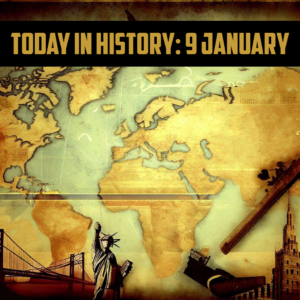The course of human history is marked by events, both big and small, that have defined eras, changed cultures, and shifted geopolitical landscapes. January 9, throughout the annals of time, has witnessed several such events across various domains. Let’s delve into a comprehensive exploration of the events that transpired on this day.
Today in History: 9 January

1. Richard Nixon’s Resignation Announcement (1960) Contrary to the more famous resignation in 1974, Nixon’s first resignation was from the race for the California governorship in 1960. After losing to John F. Kennedy in the presidential race and subsequently failing in the bid for governor, a frustrated Nixon told the press, “You won’t have Nixon to kick around anymore.” This statement, made on January 9, seemed like the end of his political career. However, he made a dramatic comeback, winning the U.S. presidency in 1968.
2. The Birth of Severus Snape (1960) In the fictional universe of J.K. Rowling’s “Harry Potter,” January 9, 1960, marks the birth of Severus Snape. While not a real historical event, Snape’s complex character and the Harry Potter series have had a significant cultural impact worldwide.
3. Construction of the Aswan Dam (1960) On this day, the USSR provided Egypt with a notable loan to finance the construction of the Aswan Dam on the Nile River. The dam, an engineering marvel, aimed to control floods, provide water for irrigation, and generate hydroelectricity. Its construction, however, led to concerns regarding the displacement of people and historical sites.
4. First Meeting of the United Nations General Assembly (1951) On January 9, 1951, the first-ever meeting of the United Nations General Assembly took place. Founded after World War II to foster global cooperation and peace, the meeting was a testament to the world’s collective hope for a better, unified future.
5. Connecticut’s European Settlement (1639) The Fundamental Orders, considered the first constitution in European North American colonies, was adopted on January 9, 1639, in present-day Connecticut. It ensured that the governance of the colony was in the hands of the people, laying the foundation for the democratic principles that would later define the United States.
6. Beginning of the Carrington-Barker Antarctic Expedition (1913) One of the lesser-known but crucial Antarctic expeditions, led by Captain Scott, departed from Cardiff on January 9, 1913. This journey made significant contributions to the understanding of Antarctica’s landscape and ecosystem.
7. The Attack on Fort Fisher (1865) January 9 witnessed a critical moment in the American Civil War when Union forces launched a massive assault on Fort Fisher in North Carolina. The fort was vital for the Confederates as it protected the trading routes of Wilmington. The Union’s capture of the fort marked a significant decline in the Confederacy’s fortunes.
8. The Siege of Zaragoza (1809) During the Peninsular War, on this day in 1809, the Siege of Zaragoza saw Napoleon’s forces relentlessly attacking the Spanish city. Despite the heroic resistance by the Spanish, the city eventually fell, highlighting the brutality of warfare and the indomitable spirit of resistance.
9. The Invention of Bubble Gum (1924) On a lighter note, January 9, 1924, saw Frank Fleer patenting the world’s first bubble gum, called “Blibber-Blubber.” Although this specific gum was never sold to the public, it paved the way for the bubble gum varieties we know and love today.
10. Introduction of the Euro (2002) On January 9, 2002, euro coins and banknotes entered into circulation, marking a major step in European economic unification. The introduction of a unified currency was a significant move, reflecting both the challenges and aspirations of the European Union.
11. The Release of the iPhone (2007) One of the most transformative technological events of recent times occurred on January 9, 2007, when Steve Jobs unveiled the first iPhone. This revolutionary product reshaped the telecommunications industry, changed global communication norms, and marked the beginning of the smartphone era.
12. The Fashoda Incident (1899) January 9, 1899, marked the official end of the Fashoda Incident, a climax in imperial tensions between the UK and France. Both nations sought to expand their African empires, leading to a standoff in the Sudanese settlement of Fashoda. Eventually, diplomacy prevailed, paving the way for the Entente Cordiale, a series of agreements that ended centuries-old rivalries.
13. The Discovery of Connecticut’s Charter (1689) Hidden in what came to be known as the “Charter Oak” to protect it from British officials, Connecticut’s charter was discovered on January 9, 1689. This event became emblematic of American resistance to British colonial rule.
14. The Formation of the Daily Universal Register (1785) On this day in 1785, the “Daily Universal Register” was founded. Three years later, it was renamed “The Times” and went on to become one of the world’s most influential newspapers.
15. Founding of the Bank of Calcutta (1809) On January 9, 1809, the Bank of Calcutta, later renamed the State Bank of India, was established, marking a significant development in the Indian banking sector. It played a crucial role in the economic growth of the region and remains a dominant entity in India’s banking landscape.
Conclusion January 9, in its quiet way, has been a witness to pivotal moments that shaped nations, cultures, economies, and human lives. From the world of technology to the fierce battlegrounds of wars, the events of this day are a testament to humanity’s constant evolution, its hopes, challenges, innovations, and the undying spirit of exploration and resilience. As with every day in history, it offers not just a reflection of our past but also lessons and inspirations for the future.

